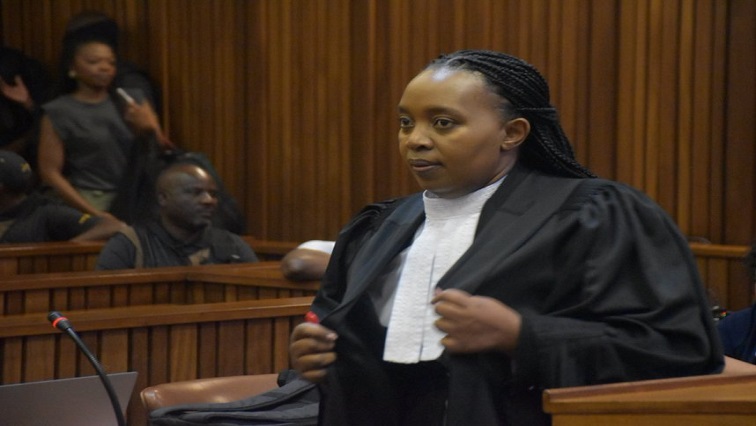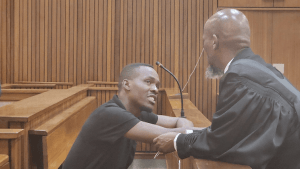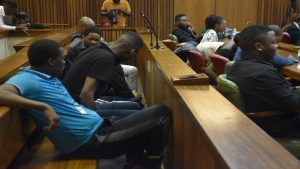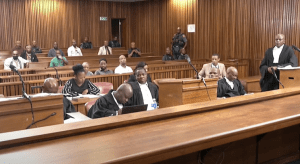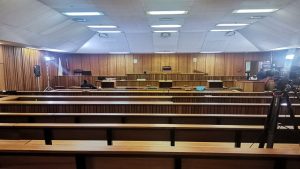The much-debated and much-anticipated recording of a confession by accused, Bongani Ntanzi, in the Senzo Meyiwa trial contains incriminating information and for that reason, the accused should have been warned beforehand that it would be used against him in court.
During arguments on the admissibility of the recording on Thursday morning, Advocate Zandile Mshololo for accused 5, Fisokuhle Ntuli, has told the court that having listened to the recording and having heard the nature of the information contained in it, Ntanzi’s constitutional rights were violated.
“My submission my lord is that as we are in a trial within a trial, until such a ruling has been made by this court, the video recording which was unconstitutionally obtained in terms of Section 35 (5) should not be played to the court because it contains incriminating information. My lord, why I am raising this is because I have listened to the recording,” says Mshololo.
Magistrate Vivian Cronje made the recording for her own use when she took down a confession by Ntanzi at the Boksburg Magistrate’s Court on the 24th of June 2020, eight days following his arrest.
The state, in its submission, told the court that the recording, although was not done for official purposes was done by Cronje in her official capacity recorded on her official laptop and was a mere electronic version of what she was reducing in writing.
Baloyi: He was in front of the magistrate, telling her, and all she did was to keep a record. The accused was on his own volution telling the magistrate.#SABCNews #SenzoMeyiwa #SenzoMeyiwaTrial
— Sipho King K Kekana (@KingKAzania) October 19, 2023
However, Mshololo, in her submission, has shot this down saying the recording was different to the statement which was submitted in court.
“I have read the document which is in front of the court (written confession) and the state has also indicated my lord that there is additional information which is not contained in the Exhibit JJ (written confession). I am submitting to say the information that the information contained in the video recording is not the same as the document submitted as Exhibit JJ if you listen to it. As a result, I submit we continue with the trial within a trial and after the ruling, the court may then listen to the video recording.”
Advocate Thulani Mngomezulu has argued the court didn’t need to listen to the recording, saying it had enough information at its disposal to come to make a ruling without having listened to it.
Mngomezulu submits that the state is only seeking to introduce the recording as evidence after realising there may be issues with the evidence taken down by Ms Cronje on the pro forma, and they are only seeking to rectify that. #SABCNews #SenzoMeyiwa #SenzoMeyiwaTrial
— Sipho King K Kekana (@KingKAzania) October 19, 2023
He has quoted Section 35 (5) of the constitution which says evidence obtained in a manner that violates any right in the Bill of Rights must be excluded if the admission of that evidence would render the trial unfair or otherwise be detrimental to the administration of justice.
“In the event there was no recording, the implication would not be that the court be at difficulty to arrive at a conclusion,” says Mngomezulu, arguing that the only person who knew the recording was being done was Cronje while the other participating parties were not informed as required by law.
Quoting a previous case on a similar matter, Judge Ratha Mokgoatlheng, said it had previously found that the judicial officer should have listened to a recording before it.
Judge: This is a case involving a magistrate in a lower court related to the transcript of a Dictaphone and telephone recording and it went on appeal and this is what the magistrate should have done…#SABCNews #SenzoMeyiwa #SenzoMeyiwaTrial
— Sipho King K Kekana (@KingKAzania) October 19, 2023
“The content of the Dictaphone could be submitted and that the magistrate himself should have listened in court to the records being played, even if he had to do so with earphones and even if no other person would have been able to hear the recording. If the records could be played, so as to be reasonably audible to the appellant, his counsel and the magistrate are at one rendering, that, in my opinion, that should have been done,” says the judge.
“From Jan Van Riebeck’s times, they are saying the court must listen. Further, he says in the case of a photograph the court itself looks at it, whereas the court itself did not hear the recording. If the recording could be so as to be audible to the court and the parties, there’s no reason why the judicial officer should listen to the recording instead of being told by some other person what he has heard,” he adds.
Mngomezulu: My lord, I still stand by my submission and I am happy that the court is quoting the matter where there were no rights at that time.
Judge: More so today because there are rights.#SABCNews #SenzoMeyiwatrial #SenzoMeyiwa
— Sipho King K Kekana (@KingKAzania) October 19, 2023
The defence has unanimously contended that the confession was done under duress and was not tendered freely and voluntarily.
The court has reserved its ruling on the matter and will deliver the judgment when court resumes on Friday morning.
In the recording, Ntanzi is understood to detail the alleged conspiracy to murder former Bafana Bafana captain, Senzo Meyiwa, who was killed at his former girlfriend Kelly Khumalo’s home in Vosloorus in 2014, the parties involved in the commission of the murder, as well the mastermind behind the crime.
If admitted the 1-hour-47-minute part of the 3-hour recording will then be played out in court.
The trial within a trial, which commenced last Friday, has been hearing arguments on the admissibility of the confession statements by accused 1 and 2, pointing out as well as warning statements by accused 3, 4 and 5.
The defence counsel for the first two accused has challenged the admissibility of accused 1, Muzi Sibiya’s confession statement, arguing it was under duress after the accused was tortured and was never tendered freely and voluntarily as required by the law.
Magistrate Vivian Cronje, who made the recording and took down the confession by Ntanzi, will later on Friday be cross-examined by the defense.


